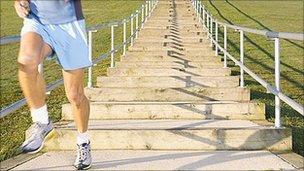15-minute daily exercise is 'bare minimum for health'
- Published
- comments

Just 15 minutes of exercise a day can boost life expectancy by three years and cut death risk by 14%, research from Taiwan suggests.
Experts in The Lancet say this is the least amount of activity an adult can do to gain any health benefit.
This is about half the quantity currently recommended in the UK.
Meanwhile, work in the British Journal of Sports Medicine suggests a couch potato lifestyle with six hours of TV a day cuts lifespan by five years.
The UK government recently updated its exercise advice to have a more flexible approach, recommending adults get 150 minutes of activity a week.
This could be a couple of 10-minute bouts of activity every day or 30-minute exercise sessions, five times a week, for example.
Experts say this advice still stands, but that a minimum of 15 minutes a day is a good place to start for those who currently do little or no exercise.
The Lancet study, based on a review of more than 400,000 people in Taiwan, showed 15 minutes per day or 90 minutes per week of moderate exercise, such as brisk walking, can add three years to your life.
And people who start to do more exercise tend to get a taste for it and up their daily quota, the researchers from the National Health Research Institutes, Taiwan, and China Medical University Hospital found.
More exercise led to further life gains. Every additional 15 minutes of daily exercise further reduced all-cause death rates by 4%.
And research from Australia on health risks linked to TV viewing suggest too much time sat in front of the box can shorten life expectancy, presumably because viewers who watch a lot of telly do little or no exercise.
England's Chief Medical Officer Sally Davies said: "Physical activity offers huge benefits and these studies back what we already know - that doing a little bit of physical activity each day brings health benefits and a sedentary lifestyle carries additional risks."
She added: "We hope these studies will help more people realise that there are many ways to get exercise, activities like walking at a good pace or digging the garden over can count too."
Prof Stuart Biddle, an expert in exercise psychology at Loughborough University, said a lot of people in the UK now fall into the category of inactive or sedentary.
He said that aiming for 30 minutes of exercise a day on pretty much every day of the week might seem too challenging for some, but starting low and building up could be achievable.
"You can get good gains with relatively small amounts of physical activity. More is always better, but less is a good place to start."
- Published16 August 2011
- Published25 March 2010
- Published10 July 2011